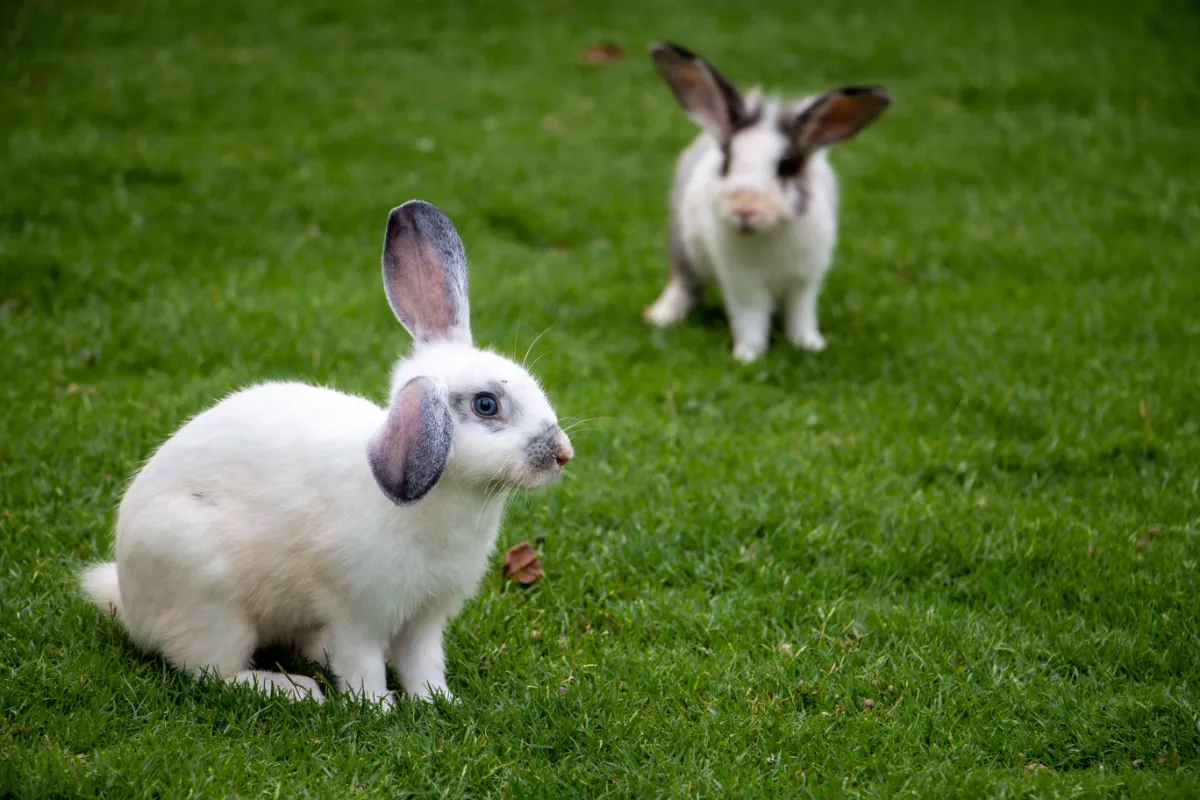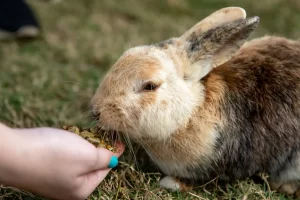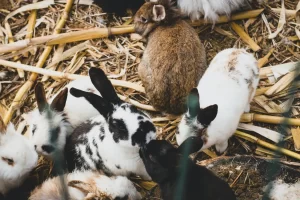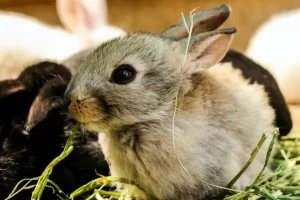If you’ve ever wondered what can send a rabbit into shock, look no further.
In this article, we’ll explore the various factors that can cause shock in rabbits.
From health conditions and traumatic injuries to stressful environments and inadequate nutrition, there are numerous reasons why these delicate creatures may experience this alarming state.
By understanding the causes, you can better protect your furry friend and ensure their well-being.
So, let’s dive in and unravel the mysteries of rabbit shock.
In This Article
- 1 Key Takeaways
- 2 Health Conditions
- 3 Traumatic Injuries
- 4 Stressful Environments
- 5 Inadequate Nutrition
- 6 Medications and Treatments
- 7 Heatstroke and Hypothermia
- 8 Surgical Complications
- 9 Frequently Asked Questions
- 9.1 Can Shock in Rabbits Be Caused by Genetic Factors?
- 9.2 Are There Any Specific Rabbit Breeds That Are More Prone to Shock?
- 9.3 Can Shock in Rabbits Be Triggered by Sudden Loud Noises?
- 9.4 Is Shock in Rabbits More Common in Younger or Older Animals?
- 9.5 Are There Any Preventive Measures That Can Be Taken to Reduce the Risk of Shock in Rabbits?
- 10 Conclusion
Key Takeaways
- Dental issues, respiratory infections, traumatic injuries, and stressful environments can all potentially cause shock in rabbits.
- Prompt veterinary care is crucial for the treatment and prevention of complications associated with these conditions.
- Inadequate nutrition can also contribute to the development of shock in rabbits, highlighting the importance of a high-fiber diet and proper hydration.
- When administering medications and treatments, it is essential to be aware of potential side effects and consult with a veterinarian if any occur.
Health Conditions
You should monitor your symptoms closely if you suspect any health conditions. Dental issues and respiratory infections are common health concerns in rabbits.
Dental problems can occur when your rabbit’s teeth aren’t properly aligned or if they’ve overgrown. This can lead to a variety of symptoms including difficulty eating, weight loss, and drooling.
Respiratory infections can be caused by bacteria, viruses, or even environmental factors such as poor ventilation or dusty bedding. Symptoms of respiratory infections in rabbits include sneezing, nasal discharge, and difficulty breathing.
It’s important to seek veterinary care if you notice any of these symptoms in your rabbit. Prompt treatment can help prevent further complications and ensure your rabbit’s health and well-being.
Traumatic Injuries
There are several common types of traumatic injuries that rabbits can experience, such as fractures and lacerations. These injuries can occur due to accidents or intentional animal attacks. It’s important to be aware of these risks and take appropriate measures to prevent them.
Here are some key points to consider:
- Accidental falls: Rabbits are naturally curious and agile animals, but they can still fall from heights and injure themselves. Make sure to secure their environment and provide safe platforms or ramps for them to climb.
- Animal attacks: Rabbits can be victims of animal attacks, especially if they’re kept outdoors or in areas with predators. It’s crucial to keep them in a secure enclosure and provide adequate protection against potential threats.
Stressful Environments
It’s important to recognize and address the factors that contribute to stressful environments in order to create a healthier and happier living space for your rabbit. Stress can have a significant impact on your rabbit’s well-being, leading to behavioral changes and physiological responses. By understanding these factors, you can take proactive steps to minimize stress and promote a more comfortable environment for your furry friend.
To help you identify potential stressors, here is a table showcasing common factors that can contribute to a stressful environment for rabbits:
| Factor | Behavioral Changes | Physiological Responses |
|---|---|---|
| Loud noises | Increased hiding | Elevated heart rate |
| Limited space | Aggression towards others | Rapid breathing |
| Lack of stimulation | Overgrooming | Decreased appetite |
| Changes in routine | Excessive chewing | Weight loss |
| Inadequate socialization | Lethargy | Weakened immune system |
Inadequate Nutrition
Make sure to provide a balanced diet and sufficient hydration for your rabbit, as inadequate nutrition can lead to serious health issues. Rabbits have specific dietary requirements that must be met in order to maintain their overall health and wellbeing. Here are some important points to keep in mind:
- A lack of proper nutrition can result in malnutrition, which can have severe consequences for your rabbit’s health.
- Rabbits require a diet that’s high in fiber, such as hay and fresh vegetables, to promote proper digestion and prevent gastrointestinal issues.
- It’s essential to provide your rabbit with a variety of fresh foods to ensure they receive all the necessary vitamins and minerals.
- Water should always be readily available for your rabbit to prevent dehydration, which can lead to a range of health problems.
Medications and Treatments
You should regularly administer the prescribed medications and treatments to ensure the effective management of your rabbit’s health. It is important to understand the potential medication side effects and discuss them with your veterinarian. Some common side effects may include gastrointestinal upset, lethargy, or allergic reactions. If any of these occur, contact your veterinarian immediately. In addition to medications, there are alternative therapies that can be used to support your rabbit’s health. These may include acupuncture, herbal medicine, or physical therapy. It is important to consult with your veterinarian before incorporating alternative therapies into your rabbit’s treatment plan. Here is a table summarizing the different medications, potential side effects, and alternative therapies for your reference:
| Medication | Side Effects | Alternative Therapies |
|---|---|---|
| Medication A | Gastrointestinal upset, lethargy, allergic reactions | Acupuncture, herbal medicine |
| Medication B | Nausea, vomiting, diarrhea | Physical therapy, chiropractic care |
| Medication C | Increased thirst, increased urination | Homeopathy, massage therapy |
Heatstroke and Hypothermia
To prevent heatstroke or hypothermia, ensure that your rabbit has access to a suitable environment and provide appropriate temperature control measures. Here are some important tips to keep in mind:
- Provide shade: Make sure your rabbit has access to shade in hot weather to avoid overheating.
- Avoid direct sunlight: Direct exposure to sunlight can increase the risk of heatstroke in rabbits. Keep them in a cool, well-ventilated area.
- Monitor indoor temperature: Keep the indoor temperature between 60-70°F (15-21°C) to prevent hypothermia.
- Use heating pads cautiously: If using a heating pad, make sure it’s set to a safe temperature and always use a cover to prevent burns.
Heatstroke prevention and hypothermia management are crucial for the well-being of your rabbit. By following these guidelines, you can ensure that your furry friend remains safe and comfortable in any weather condition.
Surgical Complications
Be aware that surgical complications can occur in a small percentage of cases, so it’s important to discuss the potential risks with your veterinarian.
Post-operative complications are a concern for both veterinarians and pet owners. One common complication is wound infections. These infections can occur when bacteria enters the surgical site, leading to redness, swelling, and discharge. It’s crucial to keep the surgical site clean and monitor for any signs of infection.
If a wound infection is suspected, it’s essential to seek veterinary care promptly. Treatment may involve antibiotics and wound care to prevent further complications. Remember to follow your veterinarian’s post-operative instructions carefully to minimize the risk of complications.
Frequently Asked Questions
Can Shock in Rabbits Be Caused by Genetic Factors?
Shock in rabbits can be caused by genetic factors, but it is often influenced by environmental factors as well. It is important to consider both aspects when assessing the risk and potential causes of shock in rabbits.
Are There Any Specific Rabbit Breeds That Are More Prone to Shock?
Certain rabbit breeds may have a higher susceptibility to shock, which can be caused by various factors. Understanding the specific breeds and their susceptibility can help in preventing and managing this condition.
Can Shock in Rabbits Be Triggered by Sudden Loud Noises?
Sudden loud noises can startle rabbits and potentially trigger shock. To prevent this, create a calm and quiet environment for your rabbit. Signs of shock include rapid breathing, pale gums, and weak pulse.
Is Shock in Rabbits More Common in Younger or Older Animals?
Shock in rabbits can occur in both younger and older animals. The effects of environmental factors, such as sudden loud noises, can contribute to shock. Additionally, stress plays a role in the development of shock in rabbits.
Are There Any Preventive Measures That Can Be Taken to Reduce the Risk of Shock in Rabbits?
To reduce the risk of shock in rabbits, you can take preventive measures. Keep their environment clean and stress-free, provide a balanced diet, and ensure proper hydration. Diet plays a crucial role in their susceptibility to shock.
Conclusion
In conclusion, shock in rabbits can be caused by a variety of factors:
- Health conditions
- Traumatic injuries
- Stressful environments
- Inadequate nutrition
- Medications and treatments
- Heatstroke
- Hypothermia
- Surgical complications
It’s important for rabbit owners to be aware of these potential causes and take necessary precautions to prevent shock in their furry friends.
By providing proper care and attention, rabbits can be kept safe and healthy, avoiding the risk of shock and its detrimental effects.





